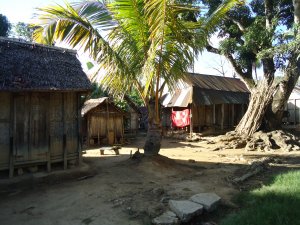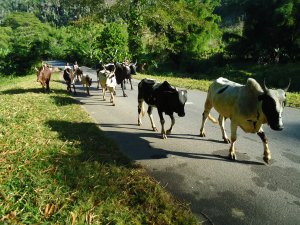The shouts and giggles of small children echo through the valley as we walk past clusters of tiny houses roofed with Ravinala leaves. Sometimes we don’t see the body that the voice belongs to. Other times, the children are peering out behind a bamboo fence. If they are very brave, and this only happens when they are in a group, they will greet us while they are walking past us on the street. Regardless of location, the greeting is always the same: “SaluVasaha!” Salu is a French hello, and Vasaha means foreigner. Hello foreigner! My response is always the same as well; “Salama Zanika Gashy!” Salama is Malagasy for hello, Zanika is child or children, and Gashy is short for Malagasy, a common slang that Malagasy people call themselves. The children never fail  to light up or shriek with laughter at the tall white foreigner speaking their language. And the adults nearby will often repeat my words and laugh themselves. We greet adults in passing with a more respectful greeting of “Akoryaby”; good day to you all.
to light up or shriek with laughter at the tall white foreigner speaking their language. And the adults nearby will often repeat my words and laugh themselves. We greet adults in passing with a more respectful greeting of “Akoryaby”; good day to you all.
These are the interactions that can be expected each time we walk through the villages surrounding the field station that now feels like home. There are 9 villages in the Kianjavato commune, the largest being Kianjavato, where we travel every morning to buy snacks for the field and sometimes on Sundays for the market. And if we are working in Sangasanga and finish early, we will make the trek from Kianajvato back through the villages to the field station. Ambalahosy and Ambodibinary lie between the field station and Kianjavato. They look almost identical, the only difference being a small school in Ambodibinary. The villages stretch only for 100 meters or so before the clusters of homes give way to rice paddies that once again engulf the land on either side of the road.
Kianjavato is only slightly bigger, but is home to several tiny shops and a few more roadside vendors that serve up various types of mofo (bread) and fruit. On Sunday market days, however, the streets are packed with people, some walking from several villages away, to peruse the piles of clothes, the produce, and the electronics that are laid out on either side of the road, on blankets or in small bamboo stands. Roosters, chickens, and the occasional duck peck and waddle their way through the crowds, while loose dogs take shelter in the shade between houses or vendors. We see familiar faces as we walk through the crowds: reforestation workers, a lemur monitoring guide, our driver, one of the cook assistants. And we purchase bananas, slices of jackfruit, and bags of mofo, for less than 3,000 ariary ($1). On the way back to the field station, we never fail to stop at one of the road side vendors in Ambodibinary or Amalahosy for peanut brittle, usually buying them out with our insatiable appetite for the sweet, nutty flavor and the ability to buy 30 pieces for 3,000 ariary.
And seemingly regardless of the day, or time of day, encountering small herds of zebu, directed by small boys and their sticks, is almost unavoidable. They commandeer the sidelines  of the roads, leaving rather large and slimy gifts behind. But neither the zebu nor the roosters and chickens occasionally strutting across the road, and no, not even the pedestrians walking from village to village have the right-a-way to the occasional taxi-brousse or truck flying through the curvy mountainous roads. Horns blaring, vehicles quickly clear the roads in front of them. It’s nice when you’re the one in the car, though not quite as nice when you’re the pedestrian.
of the roads, leaving rather large and slimy gifts behind. But neither the zebu nor the roosters and chickens occasionally strutting across the road, and no, not even the pedestrians walking from village to village have the right-a-way to the occasional taxi-brousse or truck flying through the curvy mountainous roads. Horns blaring, vehicles quickly clear the roads in front of them. It’s nice when you’re the one in the car, though not quite as nice when you’re the pedestrian.
Regardless of the constant need to watch for zebu poop or listen for taxi-brousses at every curve, I never tire of walking through the quaint villages of Kianjavato while returning the calls of “Salu Vasaha”. The walk not only provides opportunity to practice my Malagasy and load up on delicious snacks, but also gives a brief glimpse into the simple, but happy, lives of those in the communities that I feel lucky to be a part of, even for a short period of time.

